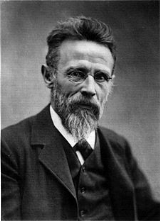
Kristian Erslev
Encyclopedia
Kristian Sophus August Erslev (1852–1930) was a famous Danish historian
. He worked on various subjects, including the whole concept of writing history. Erslev's influence on the Danish scientific community was so large, that he was considered "the master" amongst generations of Danish historians. As editor of the Danish Historisk Tidsskrift
he also set the standards for solid, factual historical writing. He looked to other European scientists for inspiration, but never fully solved the problems of objectivity and the influence of "the person behind the pen". He was openly attacked by later generations of Danish historians for his strong belief in "the truth".
Erslev was inspired in his early days by the idea that historians was able to create "true science". However, in his older days he became disillusioned by his previous ideas.
Historian
A historian is a person who studies and writes about the past and is regarded as an authority on it. Historians are concerned with the continuous, methodical narrative and research of past events as relating to the human race; as well as the study of all history in time. If the individual is...
. He worked on various subjects, including the whole concept of writing history. Erslev's influence on the Danish scientific community was so large, that he was considered "the master" amongst generations of Danish historians. As editor of the Danish Historisk Tidsskrift
Historisk Tidsskrift
Historisk Tidsskrift is a Danish history journal established in 1840. It is the oldest extant national journal for history. It is currently published in two fascicles each year. The first editor was Christian Molbech...
he also set the standards for solid, factual historical writing. He looked to other European scientists for inspiration, but never fully solved the problems of objectivity and the influence of "the person behind the pen". He was openly attacked by later generations of Danish historians for his strong belief in "the truth".
Erslev was inspired in his early days by the idea that historians was able to create "true science". However, in his older days he became disillusioned by his previous ideas.

